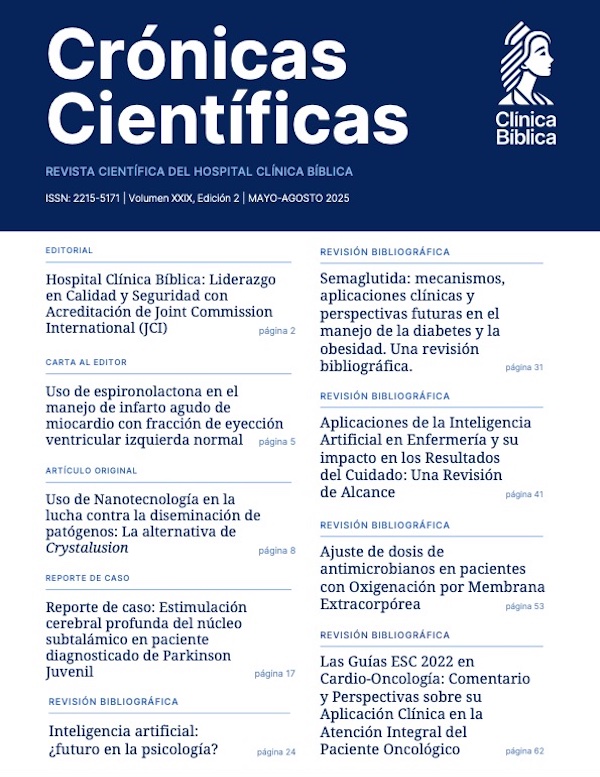- Visto: 941
Revisión bibliográfica
Espectro Clínico de los Trastornos Tiroideos en el Embarazo
Clinical Spectrum of Thyroid Disorders in Pregnancy
Edición XXIII Enero - Abril 2023
DOI: https://doi.org/10.55139/ZYLV3985
APA (7ª edición)
Coto, A., Rodríguez, D., Hernández, R., Pacheco. MP. (2023). Espectro Clínico de los Trastornos Tiroideos en el Embarazo. .Crónicas científicas, 23(23), 39-46. https://doi.org/10.55139/ZYLV3985.
Vancouver
Coto A, Rodríguez D, Hernández R, Pacheco MP. Espectro Clínico de los Trastornos Tiroideos en el Embarazo. Cron cient. 9 de setiembre de 2023;23(23):39-46.
Dra. Amanda Coto Quirós
Médico y Cirujano, Universidad de Costa Rica
Investigadora Independiente, San José, Costa Rica.
Dr. David Rodríguez Sánchez
Médico y Cirujano, Universidad de Ciencias Médicas
Investigador Independiente, San José, Costa Rica.
Dr. Rolando Hernández Gaitán
Médico y Cirujano, Universidad de Costa Rica
Investigador Independiente, San José, Costa Rica.
Dra. María Paula Pacheco Salas
Médico y Cirujano, Universidad de Costa Rica
Investigadora Independiente, San José, Costa Rica.
Resumen
Los tratarnos tiroideos son una de las patologías endocrinológicas más frecuentes en el embarazo. Las formas subclínicas son más frecuentes que el hipotiroidismo y el hipertiroidismo clínico. La tiroides sufre distintos cambios fisiológicos durante el embarazo, como la estimulación de los receptores de la hormona estimulante de la tiroides (TSH) por parte de la gonadotropina coriónica humana (hCG), y el aumento de la globulina fijadora de tiroxina (TBG); razones por lo cual ocurre una disminución de los niveles de TSH, y un incremento de los niveles totales de hormonas tiroideas, más no de los niveles libres de las mismas.
Los rangos de normalidad de TSH durante el embarazo, deberían idealmente ser definidos en cada contexto geográfico y ser específicos de cada población y trimestre de embarazo. No obstante, cuando esto no sea posible, se recomienda utilizar un límite superior de 2.5 mIU/L en el primer trimestre de embarazo, y de 3.0 mIU/L en el segundo y tercer trimestre de embarazo. Las formas clínicas de hipertiroidismo e hipotiroidismo, cuya etiología más frecuente son la enfermedad de Graves y la tiroiditis de Hashimoto, respectivamente; están asociadas a múltiples resultados adversos maternos, fetales y neonatales, por lo cual es preciso un adecuado y oportuno diagnóstico y tratamiento para garantizar el bienestar de la unidad materno-fetal. En las formas subclínicas de hipertiroidismo e hipotiroidismo, no hay evidencia científica contundente en la actualidad que las relacione con resultados adversos materno-fetales, por lo cual, no precisan de tratamiento médico.
Palabras claves
Embarazo, hipertiroidismo, hipotiroidismo, trastornos tiroideos.
Abstract
Thyroid disorders are one of the most frequent endocrinological pathologies in pregnancy. The subclinical forms are more frequent than clinical hypothyroidism and hyperthyroidism. The thyroid gland undergoes different physiological changes during pregnancy, for example, stimulation of thyroid stimulating hormone (TSH) receptors by human chorionic gonadotropin (hCG), and increased thyroxine-binding globulin (TBG); reasons for which there is a decrease in TSH levels, and an increase in total levels of thyroid hormones, but not in their free levels.
The normal ranges of TSH during pregnancy, should ideally be defined in each geographical context, and be population and trimester-specific. Nevertheless, when this is not feasible, it is recommended to use an upper limit of 2.5 mIU/L in the first trimester of pregnancy, and 3.0 mIU/L in the second and third trimesters of pregnancy. The clinical forms of hyperthyroidism and hypothyroidism, which most frequent etiology is Graves' disease and Hashimoto's thyroiditis, respectively; are in fact associated with multiple adverse maternal, fetal, and neonatal outcomes, whereby, an adequate and prompt diagnosis and treatment is required to ensure the well-being of the maternal-fetal unit. In the subclinical forms of hyperthyroidism and hypothyroidism, there is currently no conclusive scientific evidence that associates them with adverse maternal-fetal outcomes, therefore, do not require medical treatment.
Keywords
Pregnancy, hyperthyroidism, hypothyroidism, thyroid disorders.
Bibliografía
1. Landon MB, Galan HL, Jauniaux ER, et. al. Gabbe's Obstetrics: Normal and Problem Pregnancies. 8th ed. Philadelphia: Elsevier; 2021.
2. Biondi B, Kahaly GJ, Robertson RP. Thyroid dysfunction and diabetes mellitus: Two closely associated disorders. Endocrine Reviews. 2019;40(3):789-824. https://doi.org/10.1210/er.2018-00163
3. American College of Obstetricians and Gynecologists. Thyroid Disease in Pregnancy: ACOG Practice Bulletin, Number 223. Obstetrics & Gynecology. 2020;135(6):e261-e274. https://doi.org/10.1097/AOG.0000000000003893
4. Cunningham F, Leveno K, Dashe J. Williams Obstetrics. 26th ed. McGraw-Hill Education; 2022.
5. Chen Dong A, Stagnaro-Green A. Differences in Diagnostic Criteria Mask the True Prevalence of Thyroid Disease in Pregnancy: A Systematic Review and Meta-Analysis. Thyroid. 2019;29(2):278–89 https://doi.org/10.1089/thy.2018.0475
6. Maulik D, Chuy V, Kumar S. Preexisting Thyroid Disease in Pregnancy: A Brief Overview. The Journal of the Missouri State Medical Association. 2022;119(4):360-365. Disponible en: https://www.ncbi. nlm.nih.gov/pmc/articles/PMC9462902/
7. De Leo S, Pearce E. Autoimmune thyroid disease during pregnancy. The Lancet Diabetes & Endocrinology. 2018;6(7):575–86. https://doi.org/10.1016/S2213-8587(17)30402-3
8. Korevaar T, Derakhshan A, Taylor P, et al. Association of Thyroid Function Test Abnormalities and Thyroid Autoimmunity with Preterm Birth. JAMA. 2019;322(7):632. https://doi.org/10.1001/jama.2019.10931
9. Van Dijk M, Vissenberg R, Fliers E, et al. Levothyroxine in euthyroid thyroid peroxidase antibody positive women with recurrent pregnancy loss (T4LIFE trial): A multicentre, randomised, double-blind, placebo-controlled, phase 3 trial. The Lancet Diabetes & Endocrinology. 2022;10(5):322–9. https://doi.org/10.1016/S2213-8587(22)00045-6
10. Lee S, Pearce E. Testing, Monitoring, and Treatment of Thyroid Dysfunction in Pregnancy. The Journal of Clinical Endocrinology & Metabolism. 2020;106(3):883–92.
https://doi.org/10.1210/clinem/dgaa945
11. Kobaly K, Mandel S. Hyperthyroidism and Pregnancy. Endocrinology and Metabolism Clinics of North America. 2019;48(3):533–45. https://doi.org/10.1016/j.ecl.2019.05.002
12. Unuane D, Velkeniers B. Impact of Thyroid Disease on Fertility and Assisted Conception. Best Practice & Research Clinical Endocrinology & Metabolism. 2020;34(4):101378. https://doi.org/10.1016/j.beem.2020.101378
13. Nazarpour S, Amiri M, Bidhendi R, et al. Maternal Subclinical Hyperthyroidism and Adverse Pregnancy Outcomes: A systematic Review and Meta-Analysis of Observational Studies. International Journal of Endocrinology and Metabolism. 2022;20(3). https://doi.org/10.5812/ijem-120949.
14. Sullivan S. Hypothyroidism in Pregnancy. Clinical Obstetrics & Gynecology. 2019;62(2):308–19. https://doi.org/10.1097/GRF.0000000000000432
15. Turunen S, Vääräsmäki M, Leinonen M, et. al. The Increased Trend of Medical Treatment for Thyroid Diseases During Pregnancy: A 13-year National Study. European Thyroid Journal. 2021;10(3):230–6. https://doi.org/10.1159/000515125
16. Nazarpour S, Ramezani F, Simbar M, et al. Effects of Levothyroxine on Pregnant Women with Subclinical Hypothyroidism, Negative for Thyroid Peroxidase Antibodies. The Journal of Clinical Endocrinology & Metabolism. 2018;103(3):926-935. https://doi.org/10.1210/jc.2017-01850
APA (7ª edición)
Coto, A., Rodríguez, D., Hernández, R., Pacheco. MP. (2023). Espectro Clínico de los Trastornos Tiroideos en el Embarazo. .Crónicas científicas, 23(23), 39-46. https://doi.org/10.55139/ZYLV3985.
Vancouver
Coto A, Rodríguez D, Hernández R, Pacheco MP. Espectro Clínico de los Trastornos Tiroideos en el Embarazo. Cron cient. 9 de setiembre de 2023;23(23):39-46.
Esta obra está bajo una licencia internacional Creative Commons: Atribución-NoComercial-CompartirIgual 4.0 Internacional (CC BY-NC-SA 4.0)

Realizar búsqueda
Última Edición
Ediciones






